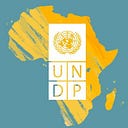How women help strengthen health systems
Good healthcare waste management practices enable the fight against COVID-19 in Africa
Every day in the current COVID-19 crisis, we are reminded of how crucial it is to have strong and sustainable healthcare facilities. But less attention is given to the proper handling and disposing of contaminated waste such as syringes, gloves and protective equipment.
In Wuhan, at the peak of the outbreak in China, hospitals generated six times as much medical waste as they did before the crisis began, which necessitated the construction of a new treatment plant and the deployment of mobile facilities (The Verge).
A public health issue
In developing countries, under-resourced healthcare facilities often struggle with segregation and sanitation procedures (WHO) in the face of more pressing issues or lack funds to acquire the right equipment. Healthcare waste is sometimes burned openly, buried or thrown out with household garbage, potentially exposing staff, patients and communities to significant threats.
“We were using an incineration system which polluted the environment and exposed our staff and patients to a lot of risks. But now, we have received 2 autoclaves which sterilize our infectious waste and turn them into safe non-hazardous general waste,” says Evans Asamoah, healthcare waste focal person at the Cape Coast Teaching Hospital in Ghana.
Since 2016, with funding from the Global Environment Facility, UNDP implements a project aimed at eliminating toxic chemicals and improving waste disposal in the health sector in Africa.
In partnership with the Ministries of Health in Ghana, Madagascar, Tanzania and Zambia, the project trains medical staff on best practices in healthcare waste management and provides hospitals across the 4 countries with autoclaves, segregation material such as bins and needle cutters, and mercury-free thermometers and blood-pressure monitors.
Educating and empowering
Fanjaranirana Raholiarimanana, a midwife specialized in paediatrics at the Mother and Child Tsaralanana Hospital in Madagascar, says she used to dispose of syringes and needles in the same bag, at the risk of pricking her fingers and contracting an infectious disease.
Now, with support from the project, Fanjaranirana has access to safer waste disposal tools: “We installed an alcohol dispenser and colored bins for waste segregation all around the hospital. She also teaches best practices to the families she is tending to; When I enter a room to talk to the parents, I immediately remind them about the [need to dispose properly] of diapers, for example.”
As a nurse and as a woman, Fanjaranirana is part of a group most at risk from contact with healthcare waste. Globally, women represent 70 percent of the healthcare and social workers, and tend to be more exposed than men to toxic chemicals and hospital-acquired infections.
Other vulnerable groups of women such as waste cleaners or scavengers are especially at risk since they usually have no easy access to information and education. This is why the project also focuses on providing trainings on waste collection and proper disposal practices through accessible channels.
“The trainings include seven different parts such as hand washing, waste disposal and mercury elimination. Focal points in public hospitals collaborate with us by doing video conferences and providing experts,” says Simon Hilaire, vice-president of a private paramedical workers’ association in Madagascar.
Since 2017, more than 250 health professionals and environmental specialists have been trained on healthcare waste management issues in Madagascar, while in Ghana, over 600 health personnel were trained on best waste management practices and on the operation and maintenance of autoclaves.
“I have learned how to do proper waste segregation… [and] appreciate that it can break [the chain] of hospital-acquired infections and keep the … environment healthy”, says Edith Amuttiy, a public health nurse at the Tegbi Health Centre, Ghana.
Beyond hospitals’ walls
As an additional benefit, healthcare waste that has been sterilized in an autoclave can be repurposed for other uses. In Madagascar, plastic and glass are recycled into paving stones, briquettes, chairs and other useful items, providing an alternative source of income for public hospitals.
Dr. Hectoria Awekeya, a general practitioner at the Eastern Regional Hospital in Koforidua, Ghana, says her skills as a regional trainer of trainers in Infection Prevention and Control (IPC) serves her at home as well. Her boys are now conscious of the need for regular hand washing and put their waste away in separate containers. This is critically important now with the COVID-19 pandemic sweeping the globe.
Knowledgeable practitioners and mothers such as Fanjaranirana or Awekeya are thus able to contribute to the fight against the COVID-19 outbreak and also give future generations an awareness that is not only necessary for the health and safety of hospitals’ staff and patients, but also more broadly for human and environmental health.
Text: Myriam Harilala Vololonarivo / UNDP Madagascar and UNDP-GEF UPOPs team in Istanbul
